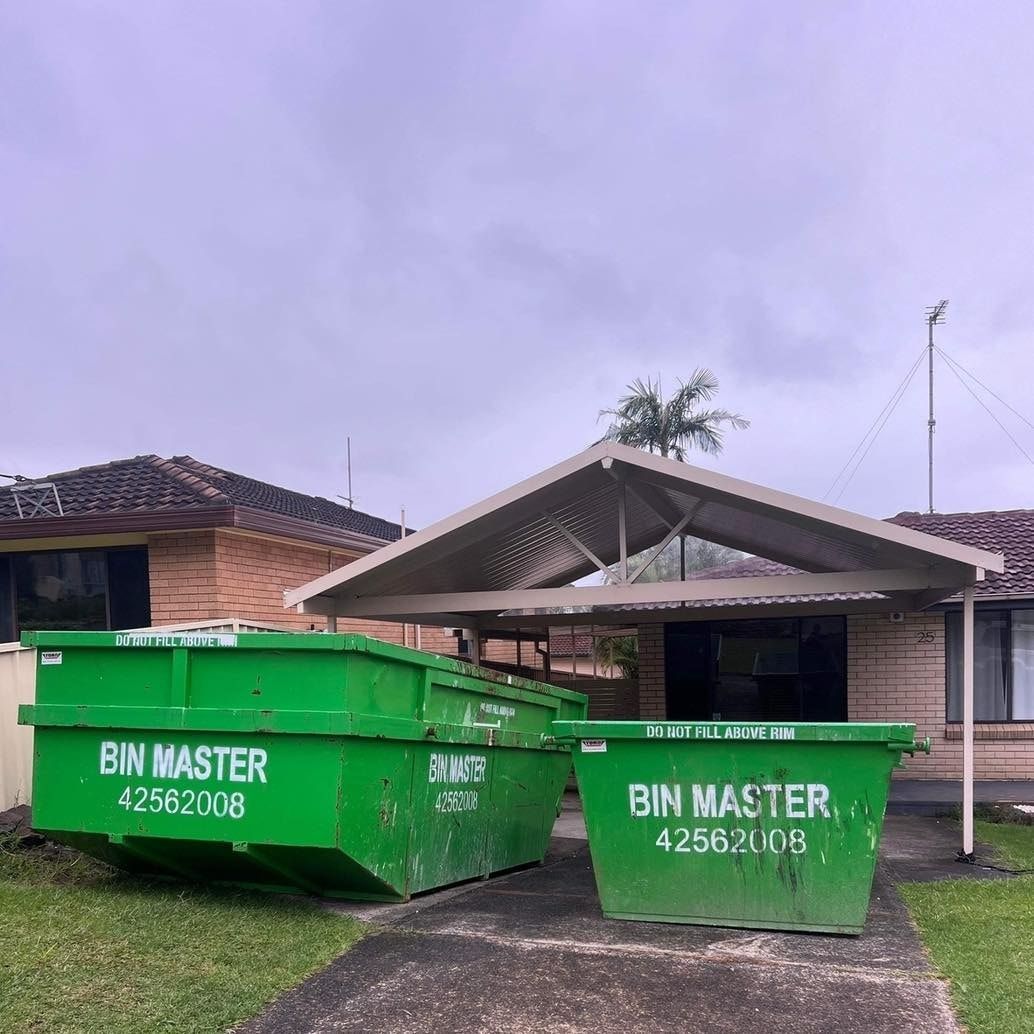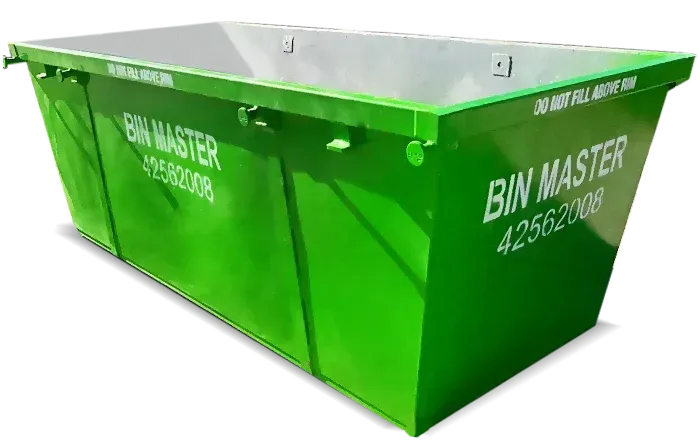Household Hazardous Waste Disposal: What You Can’t Put in a Skip Bin (and What to Do Instead)
Clearing out clutter from around the house often reveals items you forgot you even had. These may include old paint tins, used motor oil, half-full cleaning products, or broken gadgets. These aren’t your average household rubbish. They’re classified as hazardous waste, so they need to be handled differently.
While our skip bins are perfect for general waste, garden waste, furniture, and building debris, hazardous materials are not permitted due to safety risks, environmental regulations, and strict waste handling requirements.
Still, we understand that many people aren’t sure what counts as hazardous or how to get rid of it properly. That’s why we’ve created this helpful guide to household hazardous waste disposal so that you can do the right thing for your home, your safety, and the environment.
What Is Household Hazardous Waste?
Household hazardous waste refers to products commonly used in homes that contain household chemicals, chemical containers, or components that are toxic, flammable, corrosive, reactive, or environmentally harmful. While these items are safe to use when handled correctly, they can become dangerous when dumped in a landfill or thrown into the wrong bin — or when people try to mix chemicals and dispote of them incorrectly.
What Is an Example of Household Hazardous Waste?
Here are just a few everyday examples:
- Paint (oil-based and water-based)
- Used motor oil and brake fluids
- Batteries (car and household)
- Pesticides and herbicides
- Gas bottles and fire extinguishers
- Pool chemicals
- Cleaning products like ammonia or bleach
- Fluorescent light tubes
- E-waste such as TVs, phones, computers, and printers
- Asbestos, which is extremely dangerous if not handled professionally
These products are often found in garages, sheds, cupboards, and under the sink — used during home maintenance, car care, or gardening. But once they’re no longer needed, they must be safely disposed of. Failure to do so may result in environmental pollution, harm to human health, and legal consequences if the materials are dumped illegally or placed in the wrong waste stream.
Why Hazardous Waste Can’t Go in a Skip Bin
While skip bins are perfect for rubbish removal, hazardous items are a different story. Placing hazardous materials in a skip bin — or your general waste bin — creates serious risks for:
- Our drivers and waste facility workers
- The environment (soil and groundwater contamination)
- The wider public, especially if leaks or fires occur
Some substances can produce dangerous reactions when mixed with other types of waste, such as flammable liquids coming into contact with oxidisers or corrosive materials. This is why hazardous waste needs to be kept separate and managed through approved channels.
Improper disposal can lead to legal penalties, including fines from local councils or environmental authorities. That’s why we (and most skip providers across Australia) do not accept these items. But that doesn’t mean you’re on your own. There are safe, government-approved ways to manage it.
What Is the Best Method of Disposing of Household Hazardous Waste?
The best method depends on the type of waste you’re dealing with. Here are the most effective and legally compliant options:
1. Council-Run Hazardous Waste Drop-Off Events
Most Australian councils partner with state environmental departments to provide scheduled hazardous waste collection events, often several times a year. These events let you drop off small quantities of paint, oils, garden chemicals, household cleaners, and other common items.
In NSW, the Household Chemical CleanOut program offers free disposal services at designated sites across Sydney and regional areas. Similar initiatives operate in other states, such as Western Australia’s Household Hazardous Waste Program. These events accept:
- Solvents, adhesives, and household cleaners
- Poisons and garden chemicals
- Gas cylinders and fire extinguishers
- Paints and paint-related products
- Batteries and acids
- Fluorescent tubes and smoke alarms
Events are advertised on council and EPA websites and usually held at community centres, sports fields, or waste facilities.
🡲 Find your nearest CleanOut event here
2. Community Recycling Centres (CRCs)
These permanent drop-off locations accept small quantities of specific hazardous waste items year-round. CRCs across NSW will generally take:
- Paint
- Motor oils
- Household batteries
- Gas bottles
- Other oils
- Smoke detectors
- Fire extinguishers
- Car batteries
- Fluoro globes and tubes
🡲 To find your closest CRC, head to NSW CRC Locator
3. Dedicated Recycling Programs
Many types of hazardous waste can be taken back to retailers or specialist centres:
- Paint: Drop off at Paintback locations.
- Batteries: Available bins at Bunnings, ALDI, Officeworks, and council buildings.
- E-waste: Accepted at some recycling centres or council drop-off points.
- Gas bottles: Most refill stations and hardware stores accept old cylinders.
- Motor oil: Accepted at select waste transfer stations.
4. Licensed Hazardous Waste Collection Services
If you have a large volume or something particularly risky (like asbestos), hire a licensed hazardous waste contractor. These professionals are certified to transport and safely dispose of toxic substances in line with environmental regulations. This is often the best option for renovation or demolition projects where dangerous materials or industrial waste may be involved. Attempting to handle these items without proper expertise can create serious safety hazards for both people and the environment.
There are also chemical waste disposal companies that specialise in the collection, treatment, and disposal of unwanted chemicals and hazardous waste.
What Can Go in Our Skip Bins
At Bin Master Skip Bins Wollongong, we make domestic waste management easier by allowing mixed waste in most bins (with a few key exceptions). You can throw some mixed waste into the same bin, and we’ll take care of sorting it for you. We also offer separate bins for specific waste types, and pricing reflects the material loaded. If your bin is filled mostly with recyclables, we may even offer a discount.

Here’s a clear breakdown of what you can and can’t put in each type of skip bin:
1. General Waste Skip Bins (Light Waste)
Best for: Household clean-ups, furniture removal, sheds, garages, and non-hazardous waste materials
Accepted items:
- Plant and Tree Clippings
- Swings
- Timber
- Clotheslines
- Lawn Mowers
- Push Bikes
- Tools
- Machinery
- Furniture
- Toys
- Clothing
- Contents of Kitchen Cupboards
- Mattresses (additional cost)
- White Goods
- Books
Not accepted:
- Dirt, sand, soil, or clay
- Bricks, tiles and concrete
- Liquids or unwanted household chemicals
- Paints, aerosols, gas bottles
- Tyres
- Food waste
- Batteries
- Fibro or villaboard (unless certified non-asbestos)
- Loose insulation
- Asbestos or any suspected hazardous materials
Tip: General yard waste and green waste can be mixed with household waste in this bin.
2. Builders Skip Bins
Best for: Construction and demolition waste from renovations, landscaping, or building sites.
Accepted items:
- Bricks
- Tiles
- Concrete
- Timber
- Steel
- Gyprock and plasterboard
- Mixed building waste
Not accepted:
- Soil, sand, clay, or dirt (requires its own bin)
- Food waste
- Liquids, aerosols, chemicals
- Paints, tyres, gas bottles
- Fibro/villaboard (unless certified non-asbestos)
- Insulation
- Any hazardous or suspect hazardous materials
3. Concrete Skip Bins
Best for: Jobs involving concrete slab removal, brickwork, or masonry demolition.
Strictly accepted:
- Concrete
- Bricks
- Tiles
- Rocks
- Pavers
Prohibited:
- Timber, green waste, soil, general household rubbish
- Anything other than the above strictly accepted materials
4. Dirt and Soil Skip Bins
Best for: Excavation, landscaping, or backyard dig-outs.
Strictly accepted:
- Certified Virgin Excavated Natural Material (VENM) only
Prohibited:
- Green waste, rubble, concrete, bricks
- Any mixed or household waste
- Any other type of waste
Important: This bin cannot be used for any other materials. Even small amounts of contamination mean it can’t be reused or recycled.
5. Green Waste Skip Bins
Best for: Garden maintenance, yard clean-ups, tree trimming, and landscaping.
Accepted green waste:
- Branches
- Lawn clippings
- Plants and shrubs
- Untreated timber
- Wood chips and bark
Not accepted:
- Treated timber or pine
- Tree trunks over 1500mm in diameter and 500mm long
- Dirt, sand, soil, clay
- General household or building waste
- Anything other than green waste
Note: This bin must be kept green-waste only. It's a great option if you're pruning or cleaning up the yard.
6. Asbestos Hazibags (3m³)
Best for: Non-friable asbestos waste (e.g. from fencing, eaves, fibro sheets).
Included service:
- Hazibags for asbestos collection
- Licensed transport to an approved landfill
Important:
- We do not remove asbestos — only provide hazibags and collection
- Removal must be handled by a licensed professional
- All asbestos must be double-wrapped and sealed before pick-up
Both friable and non-friable asbestos are regulated, so compliance is mandatory.
7. Recyclable Materials
If your bin load consists mostly of recyclable items, we may be able to offer you a discounted rate. Let us know during booking.
Common recyclable materials we sort and process:
- Timber and hardwood
- Bricks and concrete
- Tiles
- Steel and other metals
- Cardboard
We aim to minimise what ends up in landfill. Our sorting systems and waste management practices focus on reuse and recycling wherever possible.
Quick Reference: Disposal of Household Hazardous Waste
| Item | Can it go in a skip bin? | Disposal Method |
|---|---|---|
| Paint and solvents | ❌ No | Chemical CleanOut / Paintback |
| Car and AA batteries | ❌ No | CRC / Battery drop-off bins |
| Asbestos | ❌ No | Licensed asbestos removal service |
| Gas bottles | ❌ No | CRC / Hardware store return |
| E-waste (TVs, phones, etc.) | ❌ No | Council drop-off or tech store |
| Used motor oil | ❌ No | CRC or mechanic recycling program |
| Garden waste | ✅ Yes | Skip bin |
| General rubbish | ✅ Yes | Skip bin |
| Building materials | ✅ Yes | Skip bin |
| Concrete, bricks, tiles, rocks, and pavers | ✅ Yes | Skip bin |
| Dirt and soil | ✅ Yes | Skip bin |
Final Thoughts
Not everything around the house can go in a bin, and that’s especially true when it comes to hazardous waste. From leftover unwanted paint and pesticides to old batteries and gas bottles, some items need extra care when it’s time to throw them out. Disposing of them the right way isn’t just about following the rules. It’s about protecting your family, your neighbours, and the environment. Programs like Western Australia’s Household Hazardous Waste Program and NSW’s Household Chemical CleanOut make it easier to do the right thing by offering safe, accessible drop-off options.
The good news? Most of the everyday waste from your clean-up — old furniture, garden offcuts, renovation debris — can go straight into one of our skip bins. Whether you're moving house, giving the shed a proper clean-out, or getting stuck into a weekend project, we make the process simple for you.
Not sure what can go in the bin or what to do with something unusual? Get in touch and we’ll walk you through it. Alternatively, if you don’t need a skip bin but still have rubbish you’d like removed, we also offer reliable rubbish removal services throughout Wollongong.

Bin Master Skip Bins offers a wide range of skip bin and skip bag sizes for different waste removal needs at great rates. Whether it's household waste, construction debris, or green waste, we have a suitable skip solution available for you.

